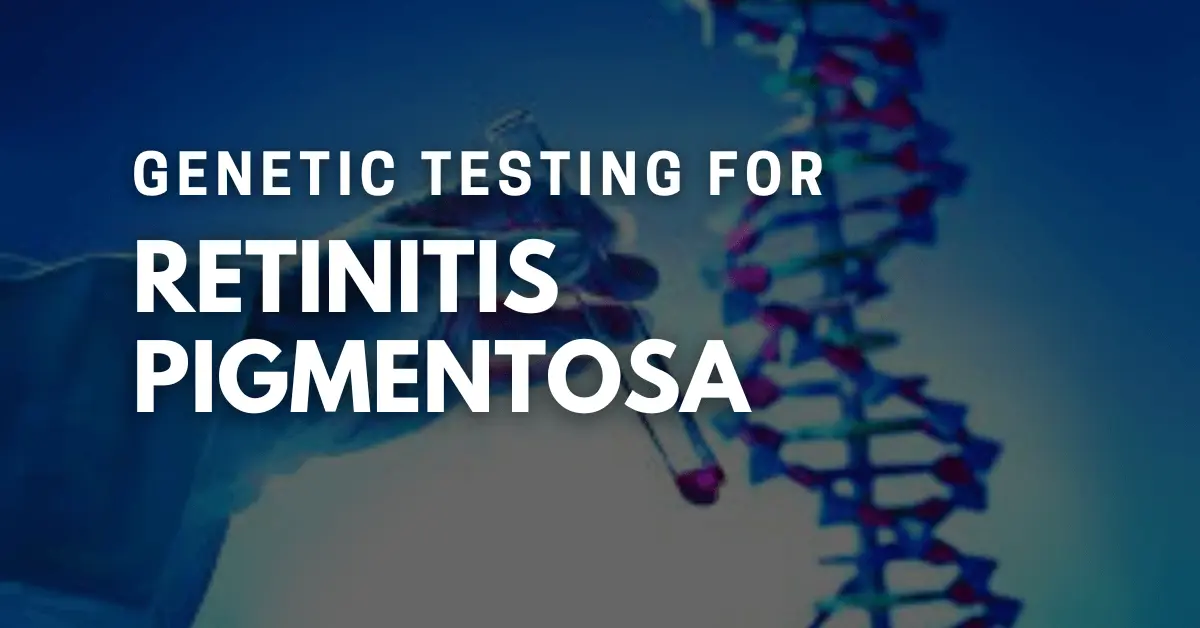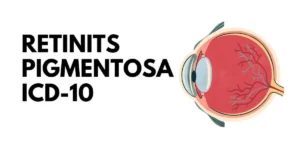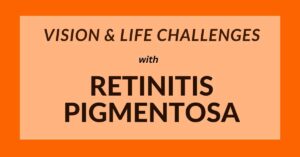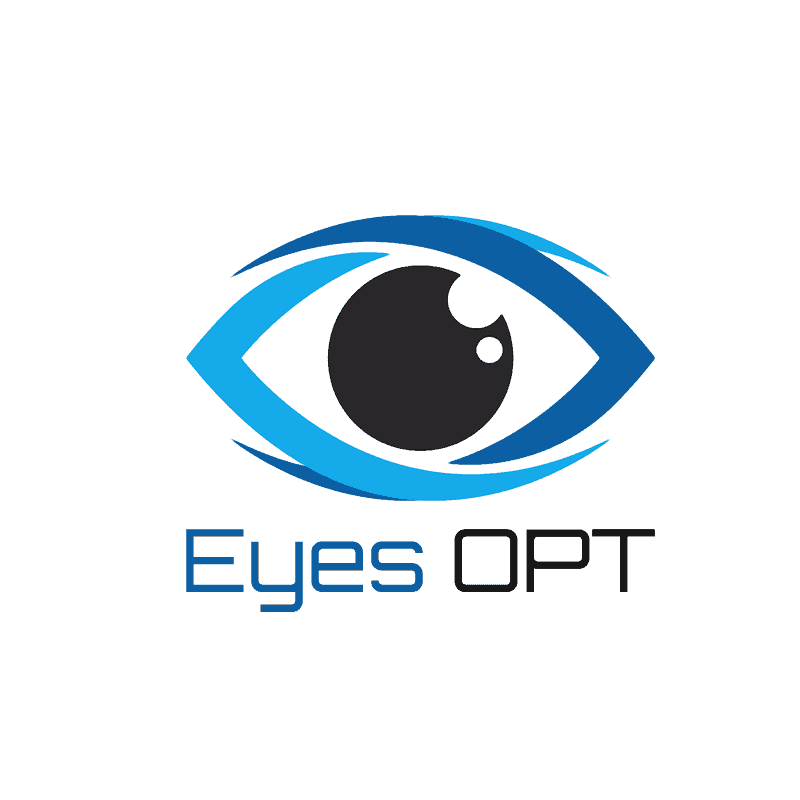Retinitis Pigmentosa (RP) is a rare and complex eye disorder that affects millions of individuals worldwide. Genetic testing, in essence, is a scientific process that allows us to delve into the intricate blueprint of our genetic makeup.
It also help us to seek answers related to hereditary diseases like Retinitis Pigmentosa (RP). It’s imperative to comprehend the intricacies of this condition and the revolutionary role that genetic testing plays in its diagnosis.
In this article, we will explore the fundamental concepts of genetic testing, understanding how and why it proves to be a valuable tool in the realm of hereditary diseases.
Table of Contents
ToggleIs Genetic Testing Available for Retinitis Pigmentosa?
Yes, genetic testing is available for Retinitis Pigmentosa (RP). Genetic testing has become an invaluable tool in diagnosing RP and understanding its underlying genetic causes.
It can help identify specific genetic mutations associated with RP in individuals, providing a more accurate diagnosis and guiding treatment decisions.
Additionally, genetic testing can be beneficial for family planning considerations and can contribute to ongoing research efforts aimed at improving our understanding of RP and developing potential therapies.
If you or someone you know is affected by RP and considering genetic testing, it is advisable to consult with a healthcare provider or genetic counselor to discuss the options and benefits of genetic testing in the specific case.
Genetic Testing for Retinitis pigmentosa
There is one most common question that has been asked many times which is, is retinitis pigmentosa hereditary? Yes, Retinitis Pigmentosa (RP) is often hereditary, meaning it can be passed down from one generation to another within families.
Many cases of RP are caused by mutations in various genes, and these genetic mutations can be inherited from one or both parents. This is why genetic testing is recommended in Retinitis Pigmentosa.
Genetic testing involves the analysis of an individual’s DNA to identify specific genetic mutations responsible for the condition.
These genetic tests have transformed our ability to diagnose retinitis pigmentosa accurately, understand its underlying genetic causes, and develop tailored treatment plans.
Importance of Genetic Testing in Medical Diagnosis
The significance of genetic testing in the diagnosis of Retinitis Pigmentosa cannot be overstated. In any inherited retinal disorder (IRD) case, the patients are dependent on genetic testing for an accurate and early diagnosis. It also plays a crucial role in:
• Personalized Treatment
Genetic testing allows healthcare providers to tailor treatment plans to an individual’s unique genetic makeup, potentially improving the effectiveness of interventions.
• Family Planning
Understanding the genetic basis of RP assists families in making informed decisions regarding family planning and the risk of passing the condition to future generations.
• Research and Advancements
Genetic testing fuels ongoing research efforts, paving the way for innovative therapies and potential cures. It empowers scientists to pinpoint the exact genetic culprits of RP, bringing us one step closer to better management and, ultimately, a cure.
Overview of Genetic Testing Methods
Genetic testing for Retinitis pigmentosa encompasses a range of sophisticated methods including targeted gene sequencing, whole-exome sequencing, and whole-genome sequencing.
Each method offers unique insights into an individual’s genetic makeup. We will discuss the potentials and limitations of these methods later in the article.
How Genetic Testing Works in Retinitis Pigmentosa?
To demystify the process, we will delve into the mechanics of genetic testing. At its core, genetic testing involves:
1. Sample Collection
A small sample of genetic material, often obtained through a blood sample or cheek swab, is collected from the individual undergoing testing.
2. Laboratory Analysis
The collected sample is sent to a specialized laboratory, where scientists use cutting-edge technology to decode the genetic information it contains.
3. Data Interpretation
Genetic experts analyze the data to identify any mutations or variations in the genes associated with retinitis pigmentosa.
4. Reporting Results
Once the analysis is complete, the results are compiled and shared with healthcare providers and genetic counselors, who can then discuss the findings with the individual.
Who Should Consider Genetic Testing for Retinitis Pigmentosa?
Determining who should undergo genetic testing for Retinitis Pigmentosa (RP) is a critical aspect of its application in healthcare. In this section, we will explore the various groups of individuals who should consider genetic testing, highlighting its significance for:
A. Individuals with a Family History of RP
One of the primary groups for whom genetic testing is highly recommended comprises individuals with a family history of RP.
Retinitis Pigmentosa often runs in families, and genetic mutations responsible for the condition can be inherited from parents. Understanding the genetic basis within a family can be pivotal.
Genetic testing allows for the early detection of RP-related mutations. Identifying these mutations in individuals with a familial history of RP can facilitate proactive measures, such as regular eye check-ups and personalized treatment plans.
Knowledge of the genetic basis of RP can aid in family planning decisions, allowing individuals and couples to make informed choices regarding the risk of passing the condition to future generations.
B. Patients with Unexplained Vision Problems
Another crucial group that should consider genetic testing includes patients with unexplained vision problems.
Vision problems can arise from a variety of causes, and diagnosing RP based solely on symptoms can be challenging. Genetic testing offers a definitive method for confirming the presence of RP-related mutations.
Without genetic testing, individuals with RP-related vision issues might be misdiagnosed or have their condition overlooked. Genetic testing ensures accurate diagnosis and appropriate treatment.
Identifying RP-related mutations in patients with unexplained vision problems allows for personalized treatment plans, ensuring that individuals receive the care and support they need.
C. Importance of Genetic Counseling
Throughout the discussion of who should consider genetic testing, we emphasize the critical role of genetic counseling. Genetic counseling is an essential component of the process, serving as a valuable resource for individuals and families.
Genetic Counselors are healthcare professionals who specialize in genetics and can provide guidance, support, and information about the genetic testing process.
Genetic counselors help individuals understand the implications of their test results, addressing questions, and concerns, and providing emotional support.
Genetic counseling ensures that individuals make informed decisions about genetic testing, treatment options, and family planning based on their unique genetic profile.
Benefits of Genetic Testing for Retinitis Pigmentosa
Genetic testing for Retinitis Pigmentosa (RP) brings forth a myriad of advantages like:
- Early Diagnosis and Personalized Treatment Plans
- Family Planning Considerations
- Participation in Research and Clinical Trials
Types of Genetic Testing for retinitis pigmentosa
One of the frequently asked questions is, is there a genetic test for retinitis pigmentosa? Genetic testing for Retinitis Pigmentosa (RP) encompasses various methods, each with its own set of advantages and limitations.
In this section, we will explore the primary types of genetic testing for RP and provide insights into the strengths and weaknesses of each method, including:
A. Targeted Gene Sequencing
- Focused Approach: Targeted gene sequencing is a precise method that hones in on specific genes known to be associated with RP. It provides a focused examination of these genes.
- Advantages: This method is highly efficient and cost-effective when the genetic mutations responsible for RP are well-known. It can quickly identify known mutations, facilitating accurate diagnosis.
- Limitations: Targeted gene sequencing may miss mutations in genes not included in the panel. It may not be suitable for cases where the underlying genetic mutation is rare or not yet identified.
B. Whole-Exome Sequencing
- Comprehensive Coverage: Whole-exome sequencing analyzes the coding regions (exons) of all genes in an individual’s DNA. It provides a broader view of genetic variations, making it suitable for cases with unknown mutations.
- Advantages: This method can identify both known and novel mutations, making it versatile for RP cases with diverse genetic causes. It offers a comprehensive assessment of the genetic landscape.
- Limitations: Whole-exome sequencing is relatively more expensive and complex than targeted sequencing. It may yield large amounts of genetic data, which can be challenging to interpret.
C. Whole-Genome Sequencing
- Unparalleled Scope: Whole-genome sequencing scrutinizes an individual’s entire genetic code, providing the most comprehensive view of their genetic makeup.
- Advantages: This method can identify not only mutations associated with RP but also variations in other genes that may impact overall health. It is the most exhaustive approach to genetic testing.
- Limitations: Whole-genome sequencing is the most resource-intensive and costly option. It generates vast amounts of data, necessitating sophisticated analysis and interpretation.
Accuracy and Interpretation of Genetic Testing Results in Retinitis Pigmentosa
Accurate interpretation of genetic testing results is paramount when it comes to diagnosing and managing Retinitis Pigmentosa (RP). Genetic testing methods for RP are highly reliable and specific when it comes to identifying specific genetic mutations.
The accuracy of these tests largely depends on the chosen method and the quality of the laboratory conducting the analysis. In some cases, genetic testing may reveal genetic variations that are not well-understood.
These variants of unknown significance (VUS) can present challenges in interpretation but are subject to ongoing research and analysis.
Understanding and Implications of Genetic Testing Results in Retinitis Pigmentosa
- Clear Communication: Genetic testing reports are typically provided in a format that is easy to understand. Healthcare providers and genetic counselors ensure that individuals and families receive clear explanations of their results.
- Positive Results: A positive result indicates the presence of RP-related genetic mutations. Understanding the implications of a positive result is crucial for individuals, as it confirms the diagnosis and informs treatment plans.
- Negative Results: A negative result suggests the absence of known RP-related mutations. It’s important to understand that a negative result does not rule out other potential genetic factors or causes of vision problems.
- Variant of Unknown Significance (VUS): In cases where a VUS is identified, individuals should be aware that ongoing research may eventually clarify the significance of these genetic variations.
Ethical and Privacy Considerations in genetic testing for Retinitis pigmentosa
When delving into genetic testing for Retinitis Pigmentosa (RP), it is essential to navigate the ethical and privacy dimensions of this transformative technology.
There are some potential risks and concerns when it comes to genetic testing:
- Genetic testing can have a profound psychological impact on individuals and families, especially in cases where RP-related mutations are identified. Potential emotional distress and anxiety should be acknowledged and addressed through counseling and support services.
- There may be dilemmas surrounding the disclosure of genetic information to family members, particularly when a positive result reveals a hereditary risk. Balancing the right to privacy with the responsibility to inform relatives can be ethically complex.
- Concerns about potential genetic discrimination in employment or insurance coverage may arise. Legal protections may vary by location, and individuals should be aware of their rights and potential risks.
- Ensuring that individuals provide informed consent for genetic testing is an ethical imperative. Individuals should be fully informed about the purpose, process, and potential implications of testing before giving consent.
- Respect for individuals’ autonomy in decision-making regarding genetic testing and the use of genetic information is paramount. Ethical principles dictate that individuals should have the freedom to make choices aligned with their values and beliefs.
- Ethical considerations encompass striking a balance between the benefits of genetic testing, such as early diagnosis and personalized treatment, and the potential harms, including psychological distress and privacy concerns.
- Protecting genetic data from unauthorized access or breaches is a critical ethical and privacy consideration. Laboratories and healthcare providers must adhere to stringent data security measures.
- Ensuring the confidentiality of genetic information is essential. Healthcare providers and genetic counselors should maintain strict confidentiality standards, only sharing information with authorized individuals.
- Individuals should have control over who has access to their genetic information. Privacy safeguards should enable individuals to make decisions about sharing their data with researchers or family members.
The Future of Genetic Testing for Retinitis Pigmentosa
The landscape of genetic testing for Retinitis Pigmentosa (RP) is constantly evolving, holding promise for significant advancements in our understanding and management of this condition.
Ongoing research efforts continue to uncover new RP-related genes and genetic variations. These discoveries expand our knowledge of the genetic landscape of RP and provide more accurate diagnostic tools.
Advances in genetic testing technologies, such as improved sequencing techniques and data analysis.
As genetic testing becomes more refined, treatments can be tailored to an individual’s unique genetic profile. This personalized approach may optimize therapeutic outcomes.
Emerging therapies, including stem cell-based approaches and optogenetics, hold promise for restoring vision in individuals with RP.
Genetic testing will continue to play a crucial role in patient selection and monitoring of treatment outcomes. Future genetic discoveries may unveil pathways for modifying the progression of RP, potentially slowing down or halting vision loss.
Genetic testing for retinitis pigmentosa cost
The cost of genetic testing for Retinitis Pigmentosa (RP) can vary widely depending on several factors, including the specific type of test, the laboratory or testing facility, the geographic location, and whether insurance covers any portion of the testing expenses.
Here are some general considerations regarding the cost of genetic testing for RP:
1. Insurance Coverage
Some health insurance plans may cover the cost of genetic testing, particularly if it is medically necessary for diagnosis or treatment planning. It is advisable to contact your insurance provider to inquire about coverage and any associated out-of-pocket expenses.
2. Type of Test
The cost can vary depending on the type of genetic test performed. Targeted gene sequencing may be less expensive than whole-exome sequencing or whole-genome sequencing, which provide more comprehensive genetic information.
3. Laboratory Fees
Different genetic testing laboratories may have different pricing structures. It’s a good idea to obtain cost estimates from multiple laboratories or testing facilities to compare prices.
4. Geographic Location
The cost of genetic testing can also vary by region or country. Laboratories in some areas may offer competitive pricing.
5. Additional Services
Some genetic testing facilities offer counseling and interpretation services as part of the testing process.
6. Research Studies
In some cases, individuals may have the option to participate in research studies or clinical trials that provide genetic testing at reduced or no cost.
It’s important to discuss the cost and payment options with the healthcare provider ordering the genetic test and to check with the chosen laboratory or testing facility for specific pricing details.
Additionally, if insurance coverage is available, it’s advisable to work closely with the insurance company to understand the coverage and any potential out-of-pocket expenses. Genetic counselors can also guide navigating the financial aspects of genetic testing.
Where to Get Genetic Testing for Retinitis Pigmentosa?
Start by consulting with an ophthalmologist, retinal specialist, or a genetic counselor who specializes in inherited eye disorders. They will assess your condition and determine if genetic testing is necessary.
If genetic testing is recommended, your healthcare provider will refer you to a genetic testing laboratory or facility that offers RP genetic testing services.
Contact the genetic testing laboratory or facility recommended by your healthcare provider. They will provide you with the necessary information on how to proceed, including scheduling an appointment or obtaining a sample collection kit.
Follow the instructions provided by the laboratory to collect the required biological sample, which is typically a blood sample or a saliva sample (collected using a cheek swab).
The genetic testing laboratory will analyze your sample to identify any RP-related genetic mutations. This process may take several weeks.
Once the analysis is complete, the laboratory will provide the results to your healthcare provider or genetic counselor. They will interpret the results and discuss them with you.
Based on the results, your healthcare provider or genetic counselor will guide appropriate next steps, which may include treatment options, family planning considerations, or further medical evaluations.
To locate a genetic testing laboratory or facility that offers RP genetic testing, you can consult with your healthcare provider for a referral, contact reputable medical centers, or search online for laboratories specializing in genetic testing for inherited eye disorders like RP.
It’s essential to work closely with your healthcare team throughout the process to ensure you receive the appropriate testing and support tailored to your specific needs.
Free genetic testing for retinitis pigmentosa
Obtaining free genetic testing for Retinitis Pigmentosa (RP) can be challenging, as genetic testing is typically associated with costs, including laboratory fees and associated healthcare expenses.
However, there are a few potential avenues to explore if you are seeking genetic testing at reduced or no cost:
1. Research Studies and Clinical Trials
Some research studies and clinical trials related to RP may offer free genetic testing as part of their research protocols. These studies often seek participants who meet specific criteria, and participation may come with the benefit of receiving genetic testing at no cost.
You can inquire with local research institutions, universities, or organizations specializing in RP research to learn about ongoing studies.
2. Nonprofit Organizations
Some nonprofit organizations focused on rare genetic disorders or inherited retinal diseases may provide financial assistance or grants to individuals seeking genetic testing for RP.
Organizations like the Foundation Fighting Blindness or local support groups for Retinitis Pigmentos a may offer information on such programs.
3. Health Insurance
Check with your health insurance provider to determine if genetic testing for RP is covered under your policy. While insurance coverage can vary, some policies may cover the cost of medically necessary genetic testing, especially if it is recommended by a healthcare provider.
4. Patient Assistance Programs
Some genetic testing laboratories and pharmaceutical companies offer patient assistance programs or financial aid to individuals who cannot afford genetic testing but meet specific criteria.
Contact the laboratory where you plan to have the test performed to inquire about any available assistance programs.
5. University Medical Centers
Some university-affiliated medical centers or teaching hospitals may offer genetic testing for research or educational purposes, and they may provide these services to eligible individuals at reduced or no cost. Contact local medical centers or universities to inquire about their programs.
It’s important to note that the availability of free genetic testing may vary depending on your location, specific circumstances, and the resources available in your area. Be prepared to provide documentation or meet specific eligibility criteria when seeking financial assistance or participating in research studies.
Conclusion
In the context of Retinitis Pigmentosa (RP), genetic testing serves as a vital tool that sheds light on the path to understanding, diagnosis, and potential solutions. Throughout our exploration, we’ve uncovered the essential roles of genetic testing, from early diagnosis to its contribution to family planning and driving scientific progress.
The precision in interpreting test results, under the guidance of genetic counselors, underscores the significance of clear communication and ethical considerations in this transformative process.
As we gaze into the future, we envision ongoing research, gene-based therapies, and an improved quality of life for individuals affected by RP. Each discovery and technological advancement takes us one step closer to a world where RP’s impact diminishes, revealing brighter prospects.
Genetic testing for Retinitis Pigmentosa embodies both scientific progress and the unwavering determination to seek a future where RP becomes a lesser burden. It’s a journey marked by scientific illumination, guided by empathy, and defined by our persistent pursuit of a world where RP is but a memo





